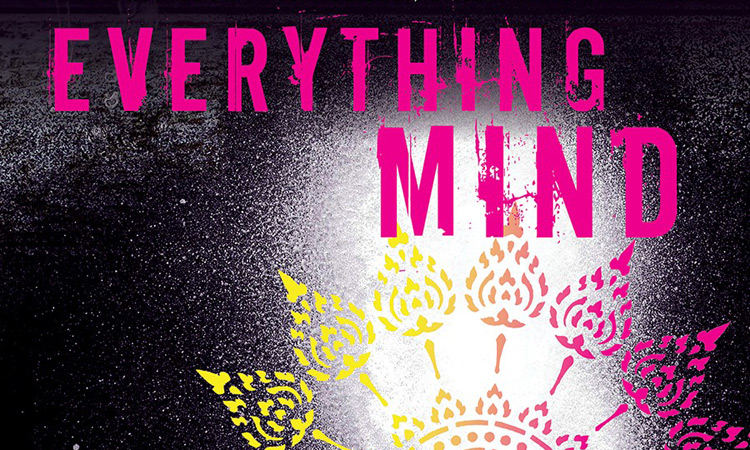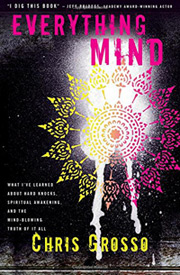
I remember back in my dating days I’d never tell a guy I loved him first, waiting in anticipation for him to say it to me. Are you the type of person who’s the first to say, “I love you”? Or are you like me?
Being open to giving and receiving love is scary; many of us don’t believe we deserve it. “I’m not good enough” or “I’m not worthy” are the limiting beliefs that prevent us from putting ourselves out there, from taking a risk, from walking up to that attractive stranger in the coffee shop or striking up a conversation with the person next to us on the train. Making yourself vulnerable isn’t easy, but I’ve learned that living in fear is no way to live.
In his new book, Everything Mind: What I’ve Learned About Hard Knocks, Spiritual Awakening, and the Mind-Blowing Truth of It All, Chris Grosso, shares how to embrace your vulnerability and become more open in all areas of your life. Written from a relatable and often personal perspective, Grosso reveals what he has learned on his spiritual journey in the hopes that it will inspire and motivate others to live their most authentic life.
Here is an excerpt on vulnerability and learning to let our hearts guide us:

Keeping our hearts open and vulnerable is one of the scariest and yet most transformative things we can do in our lives. While this may sound counterintuitive, when we keep our hearts open, touching the center of our pain and feeling it in a completely raw way, it helps us become clearer on the areas where we still have aversions and attachments—the real places where we still have work to do.
We spend so much unnecessary time suffering because we’re not in touch with our hearts’ emotional energy, intelligence, and guidance. Yes, I know it may sound corny, but it’s very real. There’s been some wonderful work done around this by the folks at HeartMath, and on the topic of heart intelligence they’ve said:
Heart intelligence is the flow of awareness, understanding and intuition we experience when the mind and emotions are brought into coherent alignment with the heart. It can be activated through self-initiated practice, and the more we pay attention when we sense the heart is speaking to us or guiding us, the greater our ability to access this intelligence and guidance more frequently. Heart intelligence underlies cellular organization and guides and evolves organisms toward increased order, awareness and coherence of their bodies’ systems.
The thing is, rather than paying attention to our hearts, the majority of us focus our attention on what our minds are telling us—which typically only reinforces the idea of our small, isolated, and separate self. We rely on this self, its direction, and all its interests and desires to find peace, happiness, and fulfillment. But as artist and teacher of Tibetan Buddhism Chagdud Tulku Rinpoche said, “If self-centeredness produced happiness, we would all be enlightened by now.” Goddamn, was he right.
I spent so many years of my life terrified (albeit unknowingly) of becoming intimate with my heart. I’m not talking about the watered-down, sentimental “heart” associated with things like Valentine’s Day or romantic-comedy movies. No, I’m talking about the spiritual heart that is the absolute core of our being, the chakra or energy center that connects all our lower and higher energies, the place that houses our deepest wisdom.
During my early years of meditation, I was a mess, and not just the times when I was actively addicted, because at least then I felt I was in control of something (though of course that was the farthest thing from the truth). It was during my times of sobriety that I was the most scared. I didn’t know a single thing about who I really was, and I’m not even talking about the deeper, esoteric “me,” but the train wreck of a face I’d see staring back at me in the mirror every time I looked.
I was trying to better myself (whoever that self was), but was still skeptical about the effectiveness of meditation and had plenty of reservations about the whole “spirituality” thing. Through this fear and uncertainty, I kept my heart at bay. I was still under the impression that meditation was supposed to make me feel awesome and somehow make everything in my life better. While I sat on my cushion and painful thoughts and emotions arose, I mistakenly believed I was “failing at being spiritual” because that’s not what I’d associated with meditation and spirituality. I had a naïve picture that being spiritual was about always feeling blissed-out and filled with light and love, so I would unskillfully use various breathing techniques and mantras (phrases or sounds repeated verbally or mentally) to suppress the negativity and hurt when they arose rather than acknowledging them and breathing in the pain, the fire of my experience.
Breathing techniques and mantras are wonderful tools, but not when they are a means of aversion. By using these practices to suppress my painful thoughts, emotions, and memories, I kept myself locked in a cycle of unnecessary pain and suffering for many years. In retrospect, I also came to see that the numerous relapses with drugs and alcohol I experienced during my struggles with sobriety were a direct result of this avoidance—an avoidance that perpetuated my unwillingness to face and deal with my life as it was falling apart around me.
Even after having learned this lesson the hard way, there are still times when I fall back into my old patterns (though thankfully not drugs and alcohol).
As human beings, I believe we all share the desire to be free of pain and suffering. For many of us, as we progress on our spiritual paths, this desire matures from a personal wish and aspiration to one that is global, meaning that we wish for all beings to be free from pain and suffering. This maturation of our desire—from personal to global—is a result of our awakening heart-mind. Bodhichitta is a word frequently used in Buddhism to describe this state of awakened heart-mind. It is a Sanskrit word, with bodhimeaning “awake” or “enlightened,” and chitta meaning “mind” or “heart.”
And so bodhichitta—our awakened (or awakening) heart-mind—becomes our compassionate desire to realize our true Self (or nonself in Buddhist terms) for the benefit of all beings, a most noble desire and undertaking, for sure. In order for us to fully develop bodhichitta, we must get raw and intimate with ourselves first, laying our hearts’ armor aside to look at and touch the place of pain and suffering that resides in our innermost selves.
Accepting ourselves fully in all of our perfect imperfections while taking an honest and fearless look at our naked selves, acknowledging both our frailty and the glory in the same glance, is not easy.
Poet Rainer Maria Rilke shared some encouragement that may help us through our difficult times when he wrote, “Let everything happen to you: beauty and terror. Just keep going. No feeling is final.” It’s so important to remember that no feeling is final while we’re working through life’s shit storms (big and small) because it’s in this remembrance that we muster the courage to carry on recognizing that our current experience of dis-ease is, in fact, only temporary.
As we intimately touch our pain and relate directly to life, we’re no longer living in fear. Instead, we’re reclaiming responsibility for our own well-being, not only for ourselves but also so that we can share it with others. We’re developing the heart of a warrior, not in the traditional sense of warfare but rather in the way Chögyam Trungpa defined it, which was with qualities such as fearlessness and gentleness. It’s through our fearlessness and gentleness that we’re able to see that Everything Mind not only includes spiritual platitudes (like the love-and-light I mistakenly believed was all there was to it back in my early days on the path), but pain and brokenness as well.

Rose Caiola
Inspired. Rewired.
Adapted from Everything Mind: What I’ve Learned About Hard Knocks, Spiritual Awakening, and the Mind-Blowing Truth of It All by Chris Grosso. Copyright © 2015 by Chris Grosso. To be published by Sounds True in October 2015.
About the Author: Chris Grosso is a public speaker, writer, recovering addict, spiritual director, and author of Indie Spiritualist: A No Bullshit Exploration of Spirituality, (Atria Books/Beyond Words, 2014). He writes for ORIGIN Magazine, Mantra Yoga & Health Magazine, and The Huffington Post, and has spoken and performed at Wanderlust Festival, Yoga Journal Conference, Sedona World Wisdom Days, Kripalu, and more. A self-taught musician, Chris has been writing, recording, and touring since the mid-90s. Visit theindiespiritualist.com
Click here to find out more about Rose’s thoughts on wellbeing and health

